| |
|
|
|
William Hart Pitsenbarger
Staff Sergeant
38TH ARRS, 3RD AIR RESCUE GROUP, 7TH AF United States Air Force Piqua, Ohio July 08, 1944 to April 11, 1966 WILLIAM H PITSENBARGER is on the Wall at Panel 6E, Line 102 See the full profile or name rubbing for William Pitsenbarger |

  |
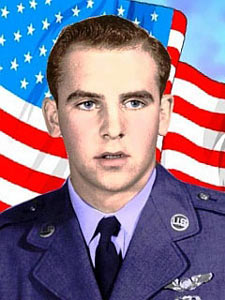
|
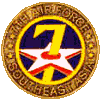
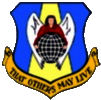
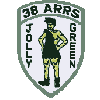
| |
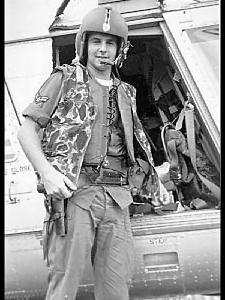
SSGT WILLIAM HART PITSENBARGER
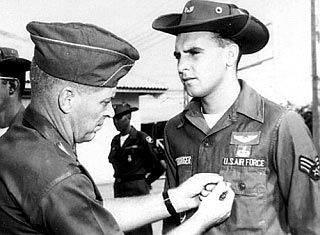
SSGT WILLIAM HART PITSENBARGER
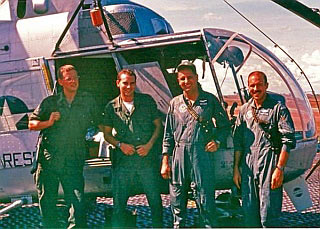
SSGT WILLIAM HART PITSENBARGER
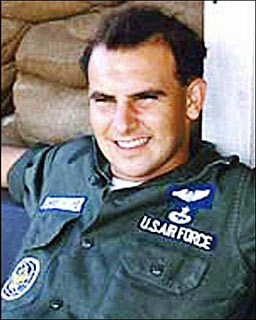
SSGT WILLIAM HART PITSENBARGER
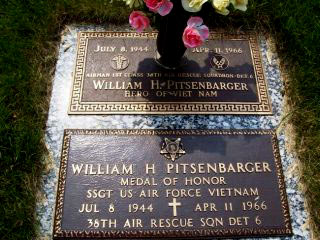
SSGT WILLIAM HART PITSENBARGER
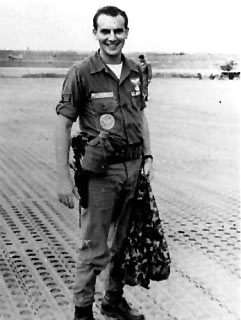
SSGT WILLIAM HART PITSENBARGER
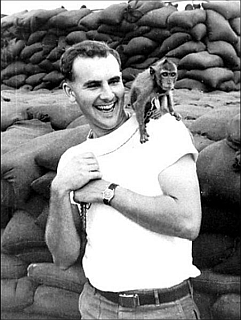
SSGT WILLIAM HART PITSENBARGER
|
|
We were friends of William Pitsenbarger's parents in Ohio. This was a very difficult time for them as he was their only son.
Gary and Shirley Nagy |
|
On this day, Sept. 9,2004, an American Flag has been purchased in memory and in honor of William H. Pitsenbarger. This flag will be displayed from September 9-12, 2004, in Findlay, Hancock County, Ohio, during the HEALING FIELD FLAG MEMORIAL along with at least 4,200 other American Flags. This flag was purchased by Bill's first cousin, Wally McMasters, and Wally's family. A photo and information regarding Bill's heroic efforts were attatched to the flag post for all who visit this incredible display of patriotism to read. God bless Bill, his parents, family, friends and his fellow soldiers living and deceased. God bless America!
From the daughter of Bill's first cousin Wally McMasters, |
|
William Pitsenbarger was a very important person in the Vietnam War. I just want you to know that everybody remembers and cares about him, and they won't forget, including me! He saved a lot of peoples' lives, and that makes him a very good person.
From |
|
William Hart Pitsenbarger was a great, generous man with lots of bravery. He sacrificed his life to save others. He refused to leave and just leave his buddies lying on the ground. Even though his body isn't there his soul is still alive with happiness. Thank you, because you made this country a safer, better place.
From an admirer, |
|
I am currently an Airman in the U.S. Air Force. I've been reading a lot about Airman Pitsenbarger and I have to say I'm nothing short of inspired. I recently heard a quote from a movie that I believe sums up this Airman's dedication to his country. "I would bleed on the flag to keep those stripes red." It moved me deeply and reminded me of Airman Pitsenbarger's sacrifice. To you Sir, and all of our brothers who fought with you, I extend my most heartfelt gratitude. Hoorah.
From an admirer, |
|
Notes from The Virtual Wall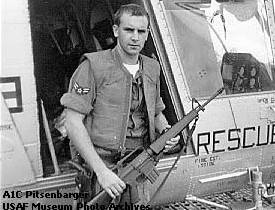
A full description of the circumstances of A1C William Pitsenbarger's death can be found here. In brief, while operating near Xa Cam My during Operation Abilene Company C, 2/16 Infantry, stumbled across the base camp of the Viet Cong D800 Battalion - and found themselves in a vicious firefight with a superior enemy force under a 150-foot-high jungle canopy. Pitsenbarger, a para-rescueman, volunteered to participate in efforts to extract wounded infantrymen. The helicopters couldn't land, but had to hover over the jungle canopy and lower a stretcher (a "Stokes litter") by cable through the canopy. Pitsenbarger again volunteered, this time to go down with the stretcher to help with the wounded. As night approached, the helicopters were forced to withdraw, leaving Pitsenbarger behind. Pitsenbarger alternated between aiding the wounded, making sapling stretchers to carry them, collecting and distributing weapons and ammunition, and actively fighting alongside the infantrymen. He was wounded three times before ultimately being killed by enemy sniper fire. The following morning, Army relief units broke through to the surrounded units, finding only 14 of the original 180 infantrymen alive and unwounded. The Army's reports of Pitsenbarger's heroism under fire were sufficient to convince the Air Force to grant the Air Force Cross to Pitsenbarger.
William Pitsenbarger also received a posthumous promotion to Staff Sergeant. |
| Contact Us | © Copyright 1997-2019 www.VirtualWall.org, Ltd ®(TM) | Last update 08/15/2019. |
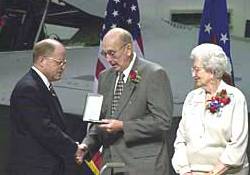 Over the years, additional eye-witness testimony became available, and the Air Force reopened Pitsenbarger's case with an eye toward upgrading his Air Force Cross to the Medal of Honor. The award was approved , and on 8 December 2000 the Secretary of the Air Force presented the Medal of Honor to his father, William Pitsenbarger, with Alice Pitsenbarger looking on.
Over the years, additional eye-witness testimony became available, and the Air Force reopened Pitsenbarger's case with an eye toward upgrading his Air Force Cross to the Medal of Honor. The award was approved , and on 8 December 2000 the Secretary of the Air Force presented the Medal of Honor to his father, William Pitsenbarger, with Alice Pitsenbarger looking on.